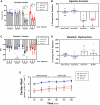The ketogenic diet does not improve cardiac function and blunts glucose oxidation in ischaemic heart failure
- PMID: 38691671
- PMCID: PMC11368127
- DOI: 10.1093/cvr/cvae092
The ketogenic diet does not improve cardiac function and blunts glucose oxidation in ischaemic heart failure
Abstract
Aims: Cardiac energy metabolism is perturbed in ischaemic heart failure and is characterized by a shift from mitochondrial oxidative metabolism to glycolysis. Notably, the failing heart relies more on ketones for energy than a healthy heart, an adaptive mechanism that improves the energy-starved status of the failing heart. However, whether this can be implemented therapeutically remains unknown. Therefore, our aim was to determine if increasing ketone delivery to the heart via a ketogenic diet can improve the outcomes of heart failure.
Methods and results: C57BL/6J male mice underwent either a sham surgery or permanent left anterior descending coronary artery ligation surgery to induce heart failure. After 2 weeks, mice were then treated with either a control diet or a ketogenic diet for 3 weeks. Transthoracic echocardiography was then carried out to assess in vivo cardiac function and structure. Finally, isolated working hearts from these mice were perfused with appropriately 3H or 14C labelled glucose (5 mM), palmitate (0.8 mM), and β-hydroxybutyrate (β-OHB) (0.6 mM) to assess mitochondrial oxidative metabolism and glycolysis. Mice with heart failure exhibited a 56% drop in ejection fraction, which was not improved with a ketogenic diet feeding. Interestingly, mice fed a ketogenic diet had marked decreases in cardiac glucose oxidation rates. Despite increasing blood ketone levels, cardiac ketone oxidation rates did not increase, probably due to a decreased expression of key ketone oxidation enzymes. Furthermore, in mice on the ketogenic diet, no increase in overall cardiac energy production was observed, and instead, there was a shift to an increased reliance on fatty acid oxidation as a source of cardiac energy production. This resulted in a decrease in cardiac efficiency in heart failure mice fed a ketogenic diet.
Conclusion: We conclude that the ketogenic diet does not improve heart function in failing hearts, due to ketogenic diet-induced excessive fatty acid oxidation in the ischaemic heart and a decrease in insulin-stimulated glucose oxidation.
Keywords: Cardiac energy metabolism; Ischaemic heart failure; Isolated working heart perfusion; Ketogenic diet; Metabolism.
© The Author(s) 2024. Published by Oxford University Press on behalf of the European Society of Cardiology. All rights reserved. For commercial re-use, please contact reprints@oup.com for reprints and translation rights for reprints. All other permissions can be obtained through our RightsLink service via the Permissions link on the article page on our site—for further information please contact journals.permissions@oup.com.
Conflict of interest statement
Conflict of interest: none declared.
Figures







Comment in
-
The ketogenic diet is unable to improve cardiac function in ischaemic heart failure: an unexpected result?Cardiovasc Res. 2024 Sep 2;120(10):1097-1099. doi: 10.1093/cvr/cvae126. Cardiovasc Res. 2024. PMID: 38842346 No abstract available.
References
-
- Bing RJ. The metabolism of the heart. Harvey Lect 1954;50:27–70. - PubMed
-
- Neubauer S, Horn M, Cramer M, Harre K, Newell John B, Peters W, Pabst T, Ertl G, Hahn D, Ingwall Joanne S, Kochsiek K. Myocardial phosphocreatine-to-ATP ratio is a predictor of mortality in patients with dilated cardiomyopathy. Circulation 1997;96:2190–2196. - PubMed
Publication types
MeSH terms
Substances
Grants and funding
LinkOut - more resources
Full Text Sources
Medical

